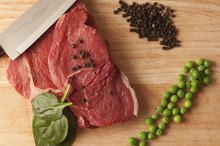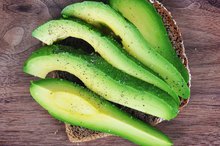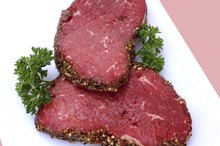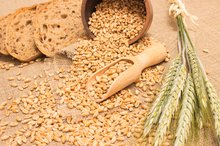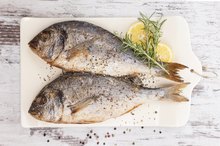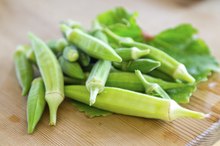The Advantages & Disadvantages of a Vegetarian Diet
People choose to follow a vegetarian diet for various reasons. Some are for ethical treatment of animals. Others wish to promote healthier lifestyles to lower their risk of certain diseases and cancer. The vegetarian diet needs to include planning to lower the chance of nutritional deficiencies that can put your health at risk. Some nutrients in the vegetarian diet are not absorbed or utilized as well as those taken from animal sources.
Advantages
A vegetarian diet is usually low in saturated fat, the solid fat found in animal meats. Saturated fats promote higher cholesterol levels, especially LDL or bad cholesterol. Plant foods, except for coconut and palm kernel oils, do not contain saturated fat. Vegetarian diets are higher in fiber than traditional meat-based diets, especially the Western diet followed in the United States. According to the University of Maryland Medical Center, following a vegetarian diet may decrease your risk of heart disease, cancer, obesity and hypertension.
- A vegetarian diet is usually low in saturated fat, the solid fat found in animal meats.
Disadvantages
List of Foods & Drinks High in Iron
Learn More
You have a lower intake of vitamin B-12 and iron with the vegetarian diet. Meats provide adequate amounts of B-12 and iron. Fortified Vitamin B-12 is necessary in vegetarian products, such as soy-based analogs and cereals. Vegetarians would need to consume large amounts of cheese, whole eggs and other dairy products to get adequate amounts of B-12. This could contribute to a greater saturated fat intake and higher cholesterol levels. Other critical vitamins and minerals lacking in the vegetarian diet include vitamin D, calcium and zinc. Omega-3 fats are easier to absorb and reduce inflammation in the body when consumed from cold-water fish than plant sources, such as flax seeds, a primary source of omega-3 fats in the vegetarian diet.
- You have a lower intake of vitamin B-12 and iron with the vegetarian diet.
- Omega-3 fats are easier to absorb and reduce inflammation in the body when consumed from cold-water fish than plant sources, such as flax seeds, a primary source of omega-3 fats in the vegetarian diet.
Nonheme Iron
A vegetarian diet has a higher concentration of nonheme iron, which means this plant-based iron is not absorbed as readily as heme iron found in animal flesh. Heme iron is in muscles and the red blood cells of animals. According to the Office of Dietary Supplements, most foods fortified with iron are with nonheme iron commonly found in plants. Nonheme iron absorption ranges from 2 to 20 percent, which varies more than heme iron absorption, which ranges from 15 to 35 percent. Nonheme iron absorption is inferior to heme iron found in animal flesh, but other dietary components of foods influence nonheme iron absorption. Vitamin C rich foods, such as citrus fruits, berries, melon, bell peppers and leafy greens, increase nonheme iron absorption, which can alleviate decreased absorption of plant-based iron.
- A vegetarian diet has a higher concentration of nonheme iron, which means this plant-based iron is not absorbed as readily as heme iron found in animal flesh.
Related Articles
References
- University of Maryland Medical Center: Vegetarianism
- Office of Dietary Supplements: Iron
- Office of Dietary Supplements - Dietary Supplement Fact Sheet: Iron. (n.d.). Retrieved August 11, 2016, from https://ods.od.nih.gov/factsheets/Iron-HealthProfessional/#h10.
- Trumbo, P., Yates, A. A., Schlicker, S., & Poos, M. (2001). Dietary reference intakes: vitamin A, vitamin K, arsenic, boron, chromium, copper, iodine, iron, manganese, molybdenum, nickel, silicon, vanadium, and zinc. Journal of the American Dietetic Association, 101(3), 294-301.
- Constantini, N. W., Eliakim, A., Zigel, L., Yaaron, M., & Falk, B. (2000). Iron status of highly active adolescents: evidence of depleted iron stores in gymnasts. International Journal of Sport Nutrition, 10(1), 62-70.
- Cowell, B. S., Rosenbloom, C. A., Skinner, R., & Summers, S. H. (2003). Policies on screening female athletes for iron deficiency in NCAA division IA institutions. International Journal of Sport Nutrition and Exercise Metabolism, 13, 277-285.
- Malczewska, J., SzczepaÅska, B., Stupnicki, R., & Sendecki, W. (2001). The assessment of frequency of iron deficiency in athletes from the transferrin receptor-ferritin index. International Journal of Sport Nutrition and Exercise Metabolism, 11(1), 42-52.
- Knovich, M. A., Storey, J. A., Coffman, L. G., Torti, S. V., & Torti, F. M. (2009). Ferritin for the clinician. Blood Reviews, 23(3), 95-104.
- Guyatt, G. H., Oxman, A. D., Ali, M., Willan, A., McIlroy, W., & Patterson, C. (1992). Laboratory diagnosis of iron-deficiency anemia. Journal of General Internal Medicine, 7(2), 145-153.
- Finch, C. A., Stray, S., Huebers, H. A., Bellotti, V., Lipschitz, D. A., Cook, J. D., & Pippard, M. J. (1986). Plasma ferritin determination as a diagnostic tool. Western Journal of Medicine, 145(5), 657.
- Hallberg, L., Brune, M., & Rossander, L. (1988). The role of vitamin C in iron absorption. International journal for vitamin and nutrition research. Supplement= Internationale Zeitschrift fur Vitamin-und Ernahrungsforschung. Supplement, 30, 103-108.
- Lane, D. J., & Richardson, D. R. (2014). The active role of vitamin C in mammalian iron metabolism: much more than just enhanced iron absorption! Free Radical Biology and Medicine, 75, 69-83.
- Bonsmann, S. S., Walczyk, T., Renggli, S., & Hurrell, R. F. (2008). Oxalic acid does not influence nonhaem iron absorption in humans: a comparison of kale and spinach meals. European Journal of Clinical Nutrition, 62(3), 336-341.
- Geerligs, P. D., Brabin, B. J., & Omari, A. A. A. (2003). Food prepared in iron cooking pots as an intervention for reducing iron deficiency anaemia in developing countries: a systematic review. Journal of Human Nutrition and Dietetics, 16(4), 275-281.
- DellaValle, D. M. (2013). Iron supplementation for female athletes: effects on iron status and performance outcomes. Current Sports Medicine Reports, 12(4), 234-239.
Writer Bio
Cydney Walker is a registered dietitian and personal trainer who began writing about nutrition and exercise during her dietetic internship in 2000. She has been featured in "Voices" and by the National Medical Association for her HIV research. She earned her master's degree in human sciences from Texas A&M University in Kingsville.
